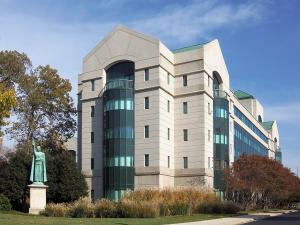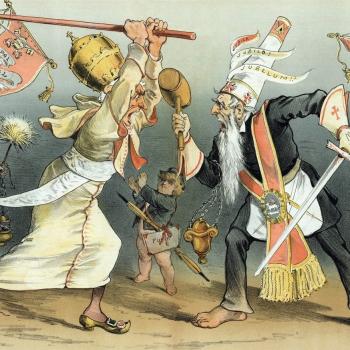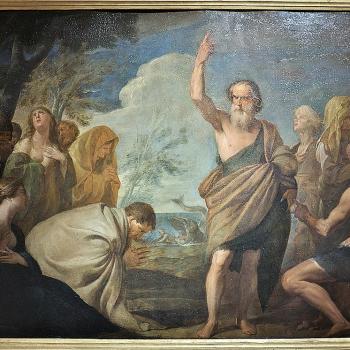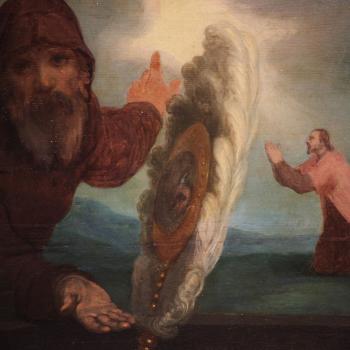
While it would be wrong to say all Protestants think alike, the popular form of evangelical Protestantism which I was raised in (as a Southern Baptist) tended to emphasize the need for correct belief (orthodoxy) over and above correct actions (orthopraxis), because they believed salvation is by faith without works. While such evangelicals will point to various sins, especially ones they culturally disapprove of, as justification for the perdition of non-believers, they tend to ignore sins against charity and continue that deemphasis when dealing with believers. That is, though they will talk about sin and the need to avoid it, the kinds of sin they speak about tend to be rather limited, and any concern for any other sin is derailed by saying Christians should not be so concerned about works. What they emphasize more than anything else is correct belief, that is, correct doctrine; if one has the right beliefs, it means they have the right faith and so are saved. This is a sentiment which I found so ingrained in my psyche so much, it influenced me when I became Catholic. My interest in systematic (dogmatic) theology came in part with my interest in knowing the right propositions to believe, and also, how to explain or defend those propositions, although of course, there were many other factors involved in my conversion (from Southern Baptist to Byzantine Catholic).
To be sure, when I became a Catholic, I understood, in theory, that faith and works must come together. But what that meant, I did not truly understand until later, after much theological and spiritual development. My study of patristics, monastic spirituality, and modern Catholic and Orthodox writers, such as the Sayings of the Desert Fathers, St. Basil the Great, St. Salvian the Presbyter, Vladimir Solovyov, Sergius Bulgakov, Dorothy Day, Donal Dorr, and Vatican II all helped me get past the way I tended to disconnect orthodoxy and orthopraxis, making me realize that they should be seen as connected, that is, there can be no orthodoxy and dogmatic reflections without orthopraxis, nor any orthopraxis without orthodoxy. What was important was not that I saw the way the two are interdependent with each other, but what orthopraxis has meant to the Christian faith as it is established in Scripture and promoted by tradition; when I did so, I saw it must include the preferential option for the poor, which meant, all forms of orthopraxis must include the promotion of charity and justice (especially social justice).
As I studied more and more, and learned more and more of the expectations of charity and social justice, I saw, within the Catholic Church in the United States, a steady decline in the way the institutional church was teaching the faithful as to how they should apply them in their lives. The link between faith and works was being cut asunder, whether it was because the Catholic Church in the United States was taking in bad cultural influences, or because Protestant converts who attained positions of prominence had not really learned how to bridge the two together, I did not know. Now, I see it is likely a combination of those two, with rich benefactors funding those who promote and establish such a divide, so that the most prominent Catholic circles end up discussing dogmatic propositions and those sins which do not hinder the rich from their exploitation of the poor. This disconnect between faith and works is especially relevant today as it explains why many in the United States consistently denigrate works of charity and social justice, especially when those works of charity are done by the institutional church in the United States (via the United States Conference of Catholic Bishops—the USCCB).
Perhaps there is no program of the USCCB which meets the most resistance, which has the most vehement opponents to it, than that of the Catholic Campaign for Human Development (CCHD). While the CCHD follows through with works of charity and social justice, showing how the two work together to help lift people out of poverty, its critics try to say such aid only helps keep them impoverished. They suggest that the people being helped are not worthy of the aid being given to them. They give all kinds of reasons why those being helped are deemed to be unworthy of that aid, from the fact that many of them are not Christians and do things which Christians believe are sinful, to the suggestion that such people are lazy and if they no longer received help, they would be motivated to work and through such work, no longer need it. Of course, that is ridiculous, as hard-working people often are in need, especially when the structures of society have been put it place making it difficult, if not impossible, for them to thrive. The few who can work their way outside of poverty by themselves only are exceptions which prove the rule, as they are far fewer than those who continue to suffer despite the inhumane levels of work some are expected to do to survive. Secondly, if this mentality were justifiable, it would undermine the whole notion of grace in the Christian tradition. For we are told no one is worthy of grace. If the critics of the CCHD are correct then no one should receive grace from God, and once they find they don’t get it, they should be able to lift themselves up and becoming holy all on their own. Obviously, such Pelagian nonsense does not work, which is why it has been deemed heretical many times in Christian history. We all need God’s grace. Without it, we will never be able to become holy on our own. Once we understand that, shouldn’t we also recognize that such nonsense is invalid in the secular sphere as well, that people who are in need of help, will not be able to work themselves out of such need?
I have been watching, with sorrow, the USCCB and the way many of its members want to stop the CCHD. Some try to say it is too expensive, but with the amount of money they spent for the so-called Eucharistic Revival, that is an absurd claim. They had the money. Others, like Bishop Thomas Paprocki writing in the Catholic Times, are far more honest, and show it is ideology which motivates them, as they promote all the extreme right-wing criticisms used against charity and the social safety net and apply it to the CCHD itself:
Since I am familiar with Saul Alinsky’s Rules for Radicals: A Pragmatic Primer for Realistic Radicals, the manual of tactics for community organizers, I will make a radical proposal: since the best way to lift people out of poverty is through a good education that will lead to gainful employment, we should let the Catholic Campaign for Human Development sunset and establish a new National Campaign for Catholic Education.
Throughout his column, Paprocki ignores the real world situation and context which lead people to need help. He treats it as a given that if people work hard, they will find themselves out of poverty. Of course, with the social structure in place, where much work does not pay living wages, this is absurd nonsense. The opportunity is often not there. It’s like he is saying we should teach people to fish while ignoring the fact the people he wants to teach are in a desert without a boat or fishing rod of their own. And that is the way things currently are. But things are going to get worse, not better, for, as I have recently suggested, the real world situation for the work force is changing, and changing radically, and that radical change is already affecting the economic situation of today. Less and less human labor is needed, as such labor is being replaced by technological advances. There will come a time where most jobs can be replaced by technology. As it is, the workforce today is already affected by this shift, which is why there are far less job opportunities, especially for jobs which pay living wages, today than yesterday, and there will be even less tomorrow than there is today. Even with an education, an education which people often have to go into debt to obtain, a debt the rich do not want to be forgiven, there is no job security, let alone guarantee for a living wage (indeed, as more people need jobs which pay a living wage, and there is less need for labor, employers will be able to offer jobs with less and less pay, knowing someone will take what is offered).
What is especially bad about Paprocki’s take, and those who think like him, is that it does not come from a Christian sentiment, but rather, from a sentiment which entirely ignores Jesus and his promotion of the poor who were being exploited and denigrated by those with wealth and power. Jesus fed people without asking them about what they have done to earn their food; Jesus healed those in need, those who were often looked down upon as deserving their fate; Jesus promoted God’s charity and promoted Christians to follow the way that he established, to look to the world, to those in need, and help them without judging or condemning them, for such judgments and condemnations are used by exploiters to justify their exploitation. Jesus, of course, was only continuing and fulfilling the tradition which God handed to the people of Israel in and through Moses, a tradition which said:
If there is among you a poor man, one of your brethren, in any of your towns within your land which the LORD your God gives you, you shall not harden your heart or shut your hand against your poor brother, but you shall open your hand to him, and lend him sufficient for his need, whatever it may be (Deut. 15:7-8 RSV).
How can the USCCB, how can bishops, read Scripture and tradition and ignore all it says about helping those in need with open hands? Again, I cannot help but go back to the way orthodoxy and orthopraxis, faith and works, have been disconnected. I was raised with the disconnect, and, through my study was able to see the problem with it; but it is a disconnect which the American society has historically promoted and so has become absorbed by many Catholics, including those in position of leadership and authority. I believe Pope Francis has been trying to stop this trend, but those who promote it have money and influence, and they are using their resources to have Catholics ignore, or reject, the basic principles which Pope Francis is using to make his criticism.
American Catholics seem to have lost a great part of their tradition, as they have been led to ignore the way God works for and promotes those who are poor, those who are in great need. The apostles wanted Christians to remember the poor and look after them, which is why, when Paul and his work to spread the faith was approved by them, they made sure he did not ignore the poor and their needs (cf. Gal 2:10). Today, what the apostles told Paul needs to be told to the bishops of the United States as they debate the status of the CCHD. They need to be told to remember the poor, even as they need to remember that Jesus gave some of his harshest criticisms to the rich who found every excuse to justify their exploitation of the poor.
Sadly, I fear, the war against the CCHD, a war which has lasted for decades, is about to end with the elimination of the CCHD. If this happens, the United States Catholic Bishops who make it happen, will need to be warned that the suffering which ensues will be on them; not only will they be culpable for what they have done, but, because of their power and authority, that culpability will be far greater than those who do not have such power and authority, even as it will also be greater because they are meant to represent the way of God to the people, while their actions, represent not the way of God, but the way of the rich and their desires for the church. Pope Francis is right to criticize what is going on in the United States, for what is going on is far from Catholic. Shows of piety and the ability to recite dogmatic propositions is not enough. The Catholic Church must not forget the poor. It must not forget the way of Christ.
*The Series Personal Reflections And Speculations will be abbreviated as PRS in the future.
Stay in touch! Like A Little Bit of Nothing on Facebook.
If you liked what you read, please consider sharing it with your friends and family!
N.B.: While I read comments to moderate them, I rarely respond to them. If I don’t respond to your comment directly, don’t assume I am unthankful for it. I appreciate it. But I want readers to feel free to ask questions, and hopefully, dialogue with each other. I have shared what I wanted to say, though some responses will get a brief reply by me, or, if I find it interesting and something I can engage fully, as the foundation for another post. I have had many posts inspired or improved upon thanks to my readers.

















